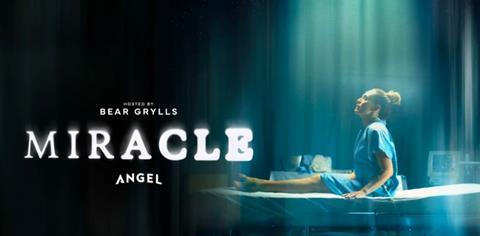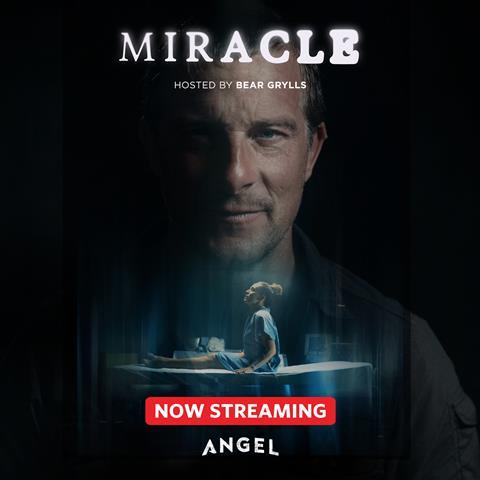One man’s desperate search for healing leads him to investigate miraculous claims with scientific rigour in Angel’s new streaming series Miracle. It’s compelling viewing, says Tim Bechervaise, but Bear Grylls’ contribution feels shoehorned in

Have you listened to testimonies of miraculous healings, rejoicing enthusiastically while suppressing another lingering emotion - scepticism?
You want to believe - and for the most part you do - but whether it’s bitter experience or stubborn rationality, question marks remain: Is this down to adrenaline or emotion? Are dodgy people making things up? Can this even be medically verified?
For Dr Joshua Brown, professor of neuroscience at Indiana University, USA, the question of whether or not God performs miracles became a desperate one after he discovered he had an inoperable brain tumour.
The genuine incredulity on his face is, in itself, a testimony to something truly astounding
“I don’t know whether God does miracles, but I have to find out,” he says in the opening episode of Miracle, a compelling new eight-part series on the viewer-supported streaming platform Angel.
Through interviews and reconstructions (and a title sequence reminiscent of a medical drama), Miracle seeks to bring together science and the supernatural to share stories that defy medical explanation and ask the question: Do you believe? The series creator is Kimberly Brown, whose own experience of a miracle inspired the project.
“God gave me a miracle”
Given his expertise and personal experience, Dr Brown’s input immediately provides a credibility that many productions about the supernatural lack.
In his search for answers, and his own healing, he and his wife visit Mozambique to meet Dr Heidi Baker (of IRIS Global), who claims that every deaf person and almost every blind person she’s seen in the past two years have been healed. Intriguingly, Dr Brown is not just an observer but a verifier, taking with him a team of doctors and scientists to measure things like visual acuity before and after prayer. “We kept careful records and, in the end, we measured fairly dramatic improvements,” he says.
Despite knowing the episode’s direction, towards Dr Brown’s eventual healing, his recollection is no less powerful. “My diagnosis gave me a death sentence, but then God gave me a miracle,” he says.
A greater miracle
Watching the opening episode, I wondered if the broader gospel message would be peripheral, as can happen with supernatural productions sometimes, but the second episode quickly allayed these concerns.

It features James Drain, who had suicidal thoughts brought on by several factors, not least the debilitating effects of multiple sclerosis, one symptom of which is severely damaged eyesight. After becoming a Christian, he asked to get baptised – and it’s then that something extraordinary happened. Emerging from the water, he notices things with his eyes that he couldn’t see before. It’s caught on camera, and the genuine incredulity on his face is, in itself, a testimony to something truly astounding. Little wonder it went viral. This “medical anomaly” has left James with almost perfect vision.
The episode then shows how Drain’s life has been transformed - not by the miracle, but by Jesus. One lady describes Drain as the “kindest man I’ve ever met”.
“The greatest miracle is not the eyesight,” says a friend. “The greatest miracle is what the Lord did in his life, who took away his sins and made him a son of God.”
This holistic approach is also reflected in episode three, featuring Joanne Moody, whose story is as much about her dependence on God in her suffering as the healing – helped by an extraordinary encounter with God during life-threatening surgery, where she was given the choice to live or die. She later learned that 400 people were praying for her at the time.
A jarring contribution
In a series focused on medically based explanations for healing, the scarcity of documental proof is a little surprising (before and after X-rays would add further credibility, for example). However, the transformation in people – physically and spiritually, which are verified by the observations of experts and friends – is unmistakable. It would take some leap – faith, even – to conclude nothing had happened.
The biggest niggle is the on-screen involvement of Bear Grylls, an executive producer on the series. The link between his daring adventures and the miraculous is overplayed, and his rather intense contributions that bookend the episodes are jarring. Clearly, his name is a pull and reflects his growing passion to talk more about his faith (including with this magazine), but surely there were more subtle ways to use him, if at all?
The music performances, by the likes of Phil Wickham and Natalie Grant, likewise will appeal to some and not others.
The series might be difficult viewing for those struggling with their unanswered prayers for healing. Hopefully this will at least be acknowledged at some point. But this is a series that aims to celebrate and credit miracles. And it does just that, helping to answer sceptical questions and invite belief.
Miracles is available to stream now on angel.com







































No comments yet